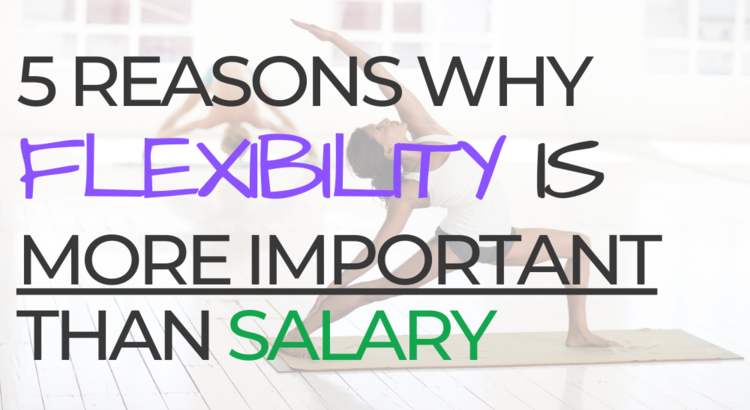Attaining a high income, however you interpret that, can seem very important. Your level of compensation is often a direct reflection of your education, hard work and experience – though sometimes it’s just due to nepotism. And you’re not supposed to talk about your income in polite company, so to let people know where you stand, you have to buy the right products, live in the right neighborhoods and sometimes leverage yourself into a frenzy.
Related: Budget Adjustments to Maximize Savings (a response to Financial Samurai’s data)
Not that there aren’t demonstrable advantages to driving modern cars and living in safer neighborhoods. Clearly having a high salary can improve the quality of your life, up to a point at least. However, income should not be the driving force of our existence, especially since our most valuable resource is time. So, if given a choice between a flexible career with a lower but reasonable salary, and a high paying job that demands a huge dedication of time, choose wisely.
Related: Does Money Buy Happiness?
1. A flexible schedule can save you money
Being tied to an office all day limits your ability to maximize your time, which in turn can cost you a lot more money than you may realize. For instance, as an office worker when you need to take personal time, you have to formally request time off. Even if you aren’t required to request time, you still have make up the work you missed, which either means coming in early, staying late or working weekends. So every time you have a sick kid or a doctor’s appointment, you can count on either losing your hard earned paid-time-off or your free time.
Related:5 Ways That Working From Home Can Make You More Money
Employers are now realizing that remote workers are perhaps even more productive than their office going counterparts. They’re a lot less expensive to maintain too, since they pay for their own work spaces. It’s not just business owners and bloggers that are becoming “digital nomads,” a growing population of office workers were made permanently remote during the Covid-19 pandemic and are now finding themselves with a vastly improved flexibility.
2. Being overworked can lead to unmanageable stress
A high-paying salary requires a huge dedication of time and/or causes an unmanageable level of stress. Regardless of whether you own your own business or you’re an employee, making the big bucks demands a total commitment. Incidentally, when you are working 80+ hours a week, owning your business actually does, “feel like work,” regardless of how passionate you are.
In my misguided past career as a tax debt consultant, I may have not worked crazy hours but the stress of trying to “raise” $20K-$25K, from 120 clients each month (not to mention attempting to protect them from IRS and state Collections) certainly made up for it. I initially hopped around from firm to firm thinking that new clients and a change of atmosphere would improve my outlook. But, it wasn’t until I quit and took a position in a different area of financial services (alternative investing) that the feelings of impending doom began to subside.
3. Your salary will improve over time anyways
When I bowed out of the stressful world of financial sales and tax debt management, I initially took a pretty steep pay cut, like over $20,000 steep. But with my new job I was able to walk to work, see my then-infant daughter during lunch breaks and leave behind the stress. I also enjoyed working in a field that I am passionate about while still being able to utilize my Enrolled Agent license and tax background. Because a large part of my previous pay was commission-based, and fluctuated wildly, I was never comfortable spending much of my income. So I was able to maintain my lifestyle on less income without feeling the impact as much. My savings rate did plummet but I had cash reserves and because I was still able to pay my expenses and contribute the maximum amount to my IRA, I focused instead on raising my salary. Over the last two years I have almost matched my previous income but with a much more valuable overall employment package and a lot less stress.
Related: (INFOGRAPHIC) How to Prioritize Your Savings
4. A higher salary may not be as impactful if you move up tax bracket
If you’re straddling the line between tax brackets and you get a raise, or take a job with higher pay, you may see much less of an increase than you thought. The US tax system is a progressive tax system, basically meaning that your income gets filtered through the various tax brackets and you pay the highest amount only on the portion of your income that falls into the highest bracket. However, the effects can still be felt between brackets: If you’re an individual filer making $150k and you take a job paying $200k, $37k of the increase receives an 8% higher tax rate. Couple this with increased state taxes and you might regret uprooting your life, even for a 50K pay increase. Besides, at that level of income 50K in additional pay feels far less significant than say, a 50K to 100K jump.
| Tax Rate | Taxable Income (Single) | Taxable Income (Married Filing Jointly) |
|---|---|---|
| 10% | Up to $9,950 | Up to $19,900 |
| 12% | $9,951 to $40,525 | $19,901 to $81,050 |
| 22% | $40,526 to $86,375 | $81,051 to $172,750 |
| 24% | $86,376 to $164,925 | $172,751 to $329,850 |
| 32% | $164,926 to $209,425 | $329,851 to $418,850 |
| 35% | $209,426 to $523,600 | $418,851 to $628,300 |
| 37% | Over 523,600 | Over $628,300 |
5. You won’t look back with regret
Even if you don’t earn back all of the income you would have made in a higher-paying but stress-inducing job, you won’t look back with regret on the additional time spent with your family, or walking your dog on a Summer day. If you are working crazy hours for years on end in an effort to achieve status or wealth, consider that most of those with status and wealth would exchange it for youth and the time to do it all again.


